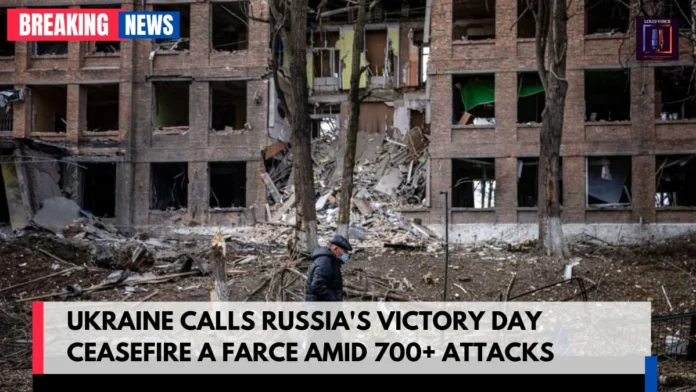Key Takeaways:
- Ukraine calls Russia’s Victory Day ceasefire a farce, citing over 700 violations within three days.
- Despite formal ceasefire declarations, Russian and Ukrainian officials accuse one another of violations.
- Civilians in Sumy suffer casualties and destruction as Moscow insists on its truce’s legitimacy.
- Zelensky dismisses the truce as a “theatrical show” and calls for a permanent 30-day peace.
- Tensions mount ahead of Russia’s Victory Day parade, with global leaders attending under security threats.
Ukraine calls Russia’s Victory Day ceasefire a farce
When the bombs are constantly dropping, what good is a ceasefire?
Ukraine is calling Russia’s much-publicized Victory Day ceasefire a “farce” after enduring over 700 attacks since the truce was supposedly enacted. As Russian President Vladimir Putin paraded Russia’s military prowess through Red Square, Ukraine was counting casualties, destroyed homes, and broken promises.
On the surface, Russia declared a unilateral three-day ceasefire beginning late Wednesday to commemorate Victory Day, its most sacred wartime holiday. But on the ground? The guns never went silent.
734 Ceasefire Violations and Counting
According to Ukraine’s foreign ministry, Russia committed at least 734 violations since the ceasefire began. Ukrainian Foreign Minister Andrii Sybiha stated that every attack received an “appropriate” military response.
The fiercest attacks came in the northern Sumy region, where buildings crumbled and lives were lost. Emergency workers reported that one civilian died after air-launched glide bombs struck Bilopillia, a town just south of the Russian border. Among the debris, they rescued a woman pinned beneath the rubble.
Ukraine’s air force noted a curious absence of missile and drone activity overnight but warned that Russian airstrikes had simply evolved—relying more on glide bombs that bypass typical air defense measures.
However, Russia’s military ministry accused Ukraine of 488 violations and said that its troops had fully complied with the truce. They claimed their troops merely “reacted in a mirror-like manner” to Ukrainian aggression.
The Ceasefire Theater: Political Spectacle or Peace Offering?
President Volodymyr Zelensky minced no words, branding the Russian ceasefire a “parade of cynicism” designed to shield Moscow’s Victory Day festivities—not civilians.
In a televised speech, Zelensky declared, “This is not a peace gesture. This is propaganda cover fire.”
He wasn’t alone in his skepticism. Ukrainian MP and soldier Sviatoslav Yurash accused Russia of deliberately deceiving the world. “We don’t want peace that lasts only a heartbeat,” he told the BBC. “We want peace that survives first contact with reality.”
The short truce echoed a similarly broken one from Easter earlier this year, when both sides traded accusations amid a supposed 30-hour ceasefire. These recurring diplomatic theatrics have led many Ukrainians to dismiss Russia’s claims of goodwill as strategic smokescreens.
Geopolitical Posturing Ahead of Moscow’s Victory Day Parade
Victory Day in Russia marks the Soviet defeat of Nazi Germany—this year, commemorating its 80th anniversary. But unlike previous years, the atmosphere was taut with fear and distrust.
Moscow buzzed with high-profile visitors like China’s President Xi Jinping, who signed new investment deals with Putin just hours before the parade. Xi described Russia-China ties as “positive energy in a chaotic world,” despite concerns from Western nations about China’s growing alignment with Moscow.
Ukraine, however, issued a stark warning: no one attending Russia’s parade could count on safety. Fears of Ukrainian drone strikes loomed large. Prior to the event, Russian authorities shut down airports and disrupted mobile internet access in strategic areas to bolster security.
Former Russian Deputy Foreign Minister Andrei Fedorov admitted, “Russia is seriously concerned about the possibility of Ukrainian drone attacks.” Kremlin spokesman Dmitry Peskov assured the public that “all necessary measures” were in place to secure the celebration.
Drones, Diplomacy, and Deceit: Who’s Really Interested in Peace?
As ceasefires collapse and cities burn, one question remains unanswered: does either side genuinely seek peace?
Stanford University researcher Sergey Sanovich told the BBC that Russia’s ceasefire wasn’t aimed at Ukraine but at foreign policymakers—particularly in the U.S. “It’s a diplomatic maneuver, not a peace gesture,” he said.
Since returning to office, President Donald Trump has pushed for a resolution to the war through direct negotiation. But critics argue his approach pressures Ukraine to accept unfavorable terms in exchange for a quick fix. Meanwhile, Russia continues to occupy 20% of Ukrainian territory, including Crimea, annexed in 2014.
And just days before the supposed ceasefire, Moscow and Kyiv exchanged hundreds of strikes—drone warfare escalating at unprecedented speed. Russia claims it destroyed 524 Ukrainian drones in a single day, though these figures remain unverified.
Sanovich noted that such attacks signal Ukraine’s resolve. “Kyiv isn’t striking out of desperation—it’s rejecting peace that’s built on surrender.”
Zelensky’s VE Day Message: “Never Again” Means Now
In a video message, President Zelensky walked through the heart of Kyiv on Victory in Europe Day, honoring slain Ukrainian soldiers at a flag memorial.
“Three years ago, the sirens returned,” he said solemnly. “Just like before. And now, again, evil must be fought—resolutely, with force.”
Zelensky contrasted Ukraine’s somber remembrance with Russia’s pageantry, emphasizing unity with Europe on May 8 and the global fight against tyranny.
Russia may be trying to frame this war in historical terms, but Ukraine is living it. Every air raid, every destroyed home, every broken truce is a grim reminder that peace cannot be achieved through performance.
Conclusion
A ceasefire that never happened is worse than none at all because it belittles diplomacy and erodes confidence. Ukraine’s refusal to accept Russia’s ceasefire is a call for honesty rather than disobedience. Zelensky and his officials maintain that parades and press releases are insufficient to achieve true peace. It necessitates honesty, responsibility, and most importantly, self-control—a quality that is still lacking on the battlefield.


